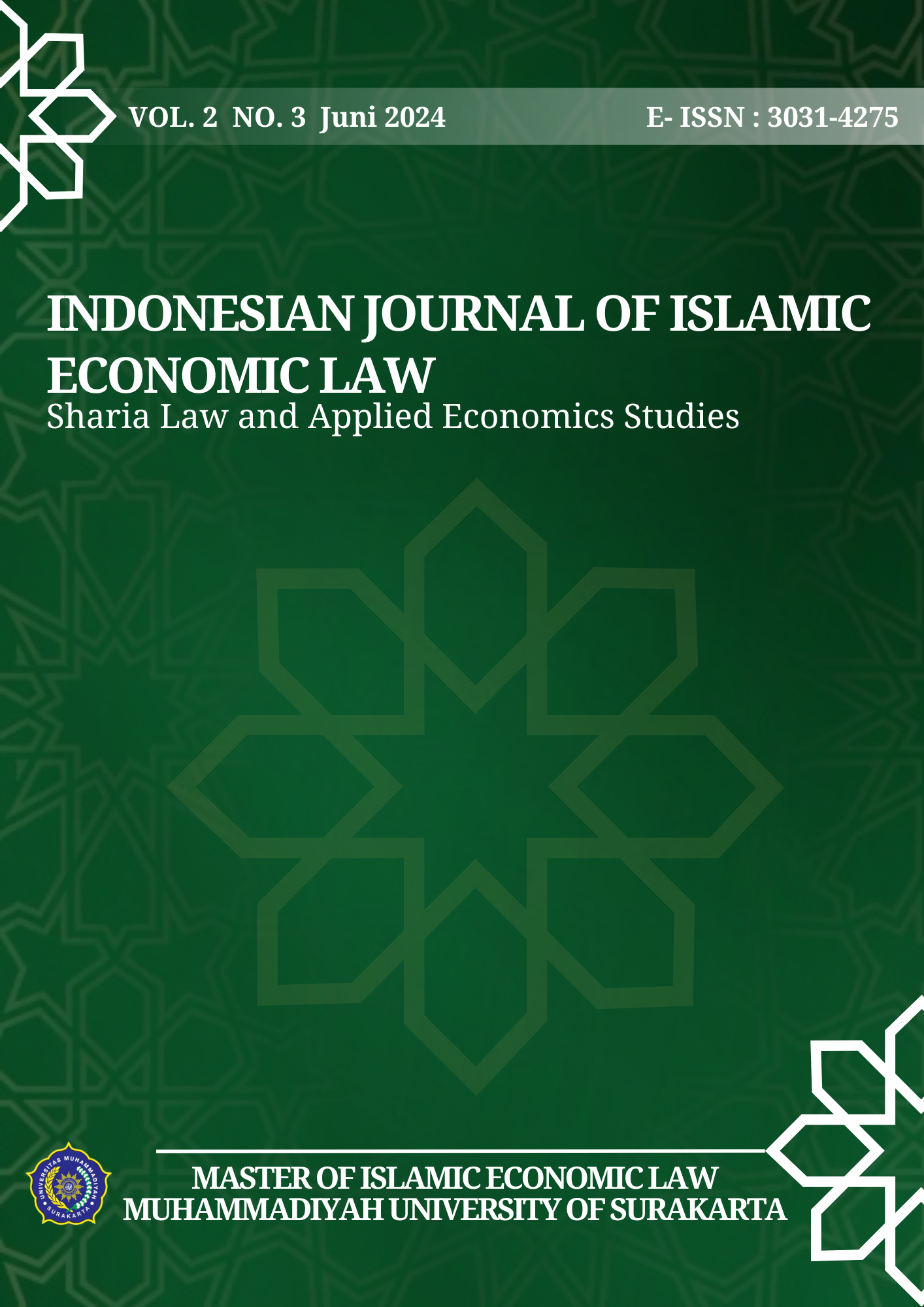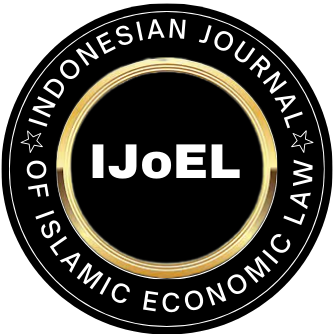Fund Placement and Loan Financing in Sharia Micro-finance: Credit risk analysis (2022-2023)
DOI:
https://doi.org/10.23917/ijoel.v1i2.4877Keywords:
Fund Placements, Loan Financing, Credit Risk AnalysisAbstract
The purpose of this study is to analyse the credit risk associated with Sharia Microfinance Institutions (MMFIs) in Indonesia. In particular, the study examines the risk associated with fund placement and loan financing over the 2022-2023 period. A qualitative method with statistical analysis is employed to evaluate the relationship between fund placement (the independent variable) and loan financing (the dependent variable). The findings indicate a positive correlation between the two variables, with an increase in fund placement resulting in an increase in loan financing. The analysis also identified downward and upward trends in the Coefficient Adequacy Ratio (CAR) of BPRS, underscoring the significance of risk management with regard to fund placement and microfinance. A decline in the quality of financing could potentially impact liquidity and increase credit risk. This study indicates a negative and symmetrical relationship between NPL BPRS and economic growth in Central Java. However, further investigation is required to ascertain the relationship between NPL BPRS and economic growth in West Java. The findings may assist the OJK and BI in formulating policies to enhance financial stability and safeguard customer funds..
Downloads
References
Amalia, Euis, and Eltom Ishaq Osman Musa. “Economic Compatibility of Islamic Economy and Pancasila: Implications for the Postgraduate Curriculum.” Indonesian Journal of Islamic Economic Law 1, no. 1 (December 7, 2023): 11–22. https://journals2.ums.ac.id/index.php/ijoel/article/view/3434.
Erlando, Angga, Feri Dwi Riyanto, and Someya Masakazu. “Financial Inclusion, Economic Growth, and Poverty Alleviation: Evidence from Eastern Indonesia.” Heliyon 6, no. 10 (October 2020): e05235. https://linkinghub.elsevier.com/retrieve/pii/S2405844020320788.
Hambali, Ahmad Imam, and Aisha Bahaaeldin Eprahim Ali. “Social Funding Programs in Non-Depository Credit Cooperatives: A Perspective on Positive Law and Sharia Principles.” Indonesian Journal of Islamic Economic Law 1, no. 1 (December 7, 2023): 50–59. https://journals2.ums.ac.id/index.php/ijoel/article/view/3439.
Isman, I, and Ahmad Zainul Muttaqin. “Innovative Legal Modelling for Interdisciplinary Studies on Law and Economic Behavior.” Indonesian Journal of Islamic Economic Law 1, no. 1 (December 7, 2023): 60–71. https://journals2.ums.ac.id/index.php/ijoel/article/view/3437.
Kamarulzaman, N.H., N.A. Muhamad, and N. Mohd Nawi. “An Investigation of Adoption Intention of Halal Traceability System among Food SMEs.” Journal of Islamic Marketing 13, no. 9 (2022): 1872–1900.
Khan, S., A. Haleem, M.I. Khan, M.H. Abidi, and A. Al-Ahmari. “Implementing Traceability Systems in Specific Supply Chain Management (SCM) through Critical Success Factors (CSFs).” Sustainability (Switzerland) 10, no. 1 (2018).
Mubarak, Jaih, and Shaifurrokhman Mahfudz. “Best Practice Review: Enhancing the Quality of Shariah Economist Scholars.” Indonesian Journal of Islamic Economic Law 1, no. 1 (December 7, 2023): 1–10.
Muhamad, N.A., N.H. Kamarulzaman, and N.M. Nawi. “Agro-Food SMEs’ Intention to Adopt Halal Traceability System.” Food Research 4 (2020): 93–98.
Najmi, A., W. Ahmed, and S. Jahangir. “Firm’s Readiness for Halal Food Standard Adoption: Assessing the Importance of Traceability System.” Journal of Islamic Accounting and Business Research 14, no. 8 (2023): 1451–1473.
Nasyiah, T., I. Masudin, F. Zulfikarijah, D. Kannan, A. Rumijati, and R. Wijaya. “Explaining Sustainable Performance With SEM-FsQCA: The Role of Traceability Systems, Knowledge Management, Halal SCM Practices, and Spiritual Leadership in Small-Medium Enterprises (SMEs).” IEEE Transactions on Engineering Management 71 (2024): 5691–5705.
Nawi, N.M., H.N. Basri, N.H. Kamarulzaman, and M.N. Shamsudin. “Consumers’ Preferences and Willingness-to-Pay for Traceability Systems in Purchasing Meat and Meat Products.” Food Research 7, no. 1 (2023): 1–10.
Razak, Ghadafi M., Linda C. Hendry, and Mark Stevenson. “Supply Chain Traceability: A Review of the Benefits and Its Relationship with Supply Chain Resilience.” Production Planning and Control 34, no. 11 (2023): 1114–1134.
Rohman, Pupun Saepul, Bayu Arie Fianto, Syed Alamdar Ali Shah, Umar Nawaz Kayani, Noven Suprayogi, and Indri Supriani. “A Review on Literature of Islamic Microfinance from 2010-2020: Lesson for Practitioners and Future Directions.” Heliyon 7, no. 12 (December 2021): e08549. https://linkinghub.elsevier.com/retrieve/pii/S2405844021026529.
Saifudin, A.M., S.N. Othman, and E.M. Elias. “Critical Factors of the New Islamic Supply Chain Model through the Lens of Descriptive Data Analysis.” International Journal of Supply Chain Management 6, no. 1 (2017): 203–208.
Shofawati, A. The Role of Islamic Fintech in Indonesia to Improve Financial Inclusion for Resolving SDGs. Artificial Intelligence, Fintech, and Financial Inclusion, 2023.
Sumarliah, E., T. Li, B. Wang, F. Fauziyah, and I. Indriya. “Blockchain-Empowered Halal Fashion Traceability System in Indonesia.” International Journal of Information Systems and Supply Chain Management 15, no. 2 (2022).
Theodoridis, Theodoros, and Juergen Kraemer. “Pola Sinergitas Dalam Mekanisme Self Declare Halal” (n.d.): 149–178.
Vanany, I., D.I. Maftuhah, A. Soeprijanto, Sukoso, and M. Zulhafizh. “Modelling Halal Internal Traceability in Open Source ERP System for Chicken Meat Processing Company.” In IEEE International Conference on Industrial Engineering and Engineering Management, 1017–1021, 2019.
Wasiaturrahma, Shochrul Rohmatul Ajija, Raditya Sukmana, Tita Novita Sari, and Ahmad Hudaifah. “Breadth and Depth Outreach of Islamic Cooperatives: Do Size, Non-Performing Finance, and Grant Matter?” Heliyon 6, no. 7 (July 2020): e04472. https://linkinghub.elsevier.com/retrieve/pii/S2405844020313165.
Wasiaturrahma, Raditya Sukmana, Shochrul Rohmatul Ajija, Sri Cahyaning Umi Salama, and Ahmad Hudaifah. “Financial Performance of Rural Banks in Indonesia: A Two-Stage DEA Approach.” Heliyon 6, no. 7 (July 2020): e04390. https://linkinghub.elsevier.com/retrieve/pii/S2405844020312342.
Wijaya, I.F., A. Moro, and Y. Belghitar. “Does Religiosity Affect Financing Activity? Evidence from Indonesia.” Business Ethics, the Environment and Responsibility 32, no. 2 (2023): 670–697.
Downloads
Submitted
Accepted
Published
How to Cite
Issue
Section
License
Copyright (c) 2024 Rahmat Rahmat, Abdani Abdani, Yusuf Rohmat Yanuri

This work is licensed under a Creative Commons Attribution 4.0 International License.










